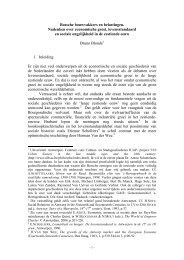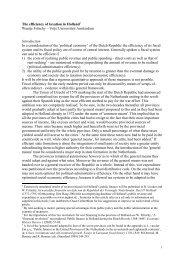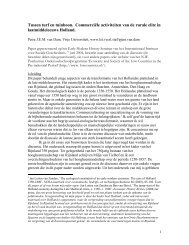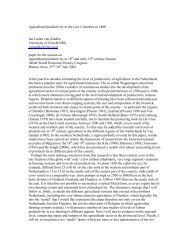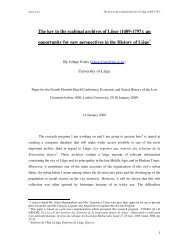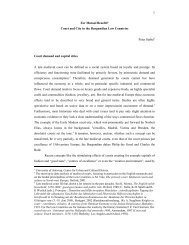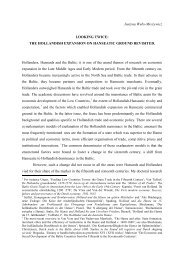Amsterdam as the cradle of modern futures and options trading ...
Amsterdam as the cradle of modern futures and options trading ...
Amsterdam as the cradle of modern futures and options trading ...
You also want an ePaper? Increase the reach of your titles
YUMPU automatically turns print PDFs into web optimized ePapers that Google loves.
<strong>Amsterdam</strong> <strong>as</strong> <strong>the</strong> principal market for Baltic grain, herring, <strong>and</strong> o<strong>the</strong>r bulk commodities.<br />
Once <strong>the</strong> Peace <strong>of</strong> Spyer (1544) had secured a clear transit through <strong>the</strong> Danish Sound for<br />
Dutch shipm<strong>as</strong>ters, merchants from Hanse towns <strong>and</strong> Antwerp started buying grain in<br />
<strong>Amsterdam</strong>. 30 By 1560 annual imports <strong>of</strong> Baltic grain amounted to <strong>as</strong> much <strong>as</strong> 3 million<br />
guilders. 31 Just like exchange rates in Antwerp, <strong>Amsterdam</strong> prices for wheat <strong>and</strong> rye were<br />
quoted every day <strong>of</strong> <strong>the</strong> year. 32 In 1556 <strong>the</strong> city confirmed <strong>the</strong> custom that prices <strong>of</strong> every<br />
transaction over ½ l<strong>as</strong>t grain (roughly 1,500 liters) had to be reported to one <strong>of</strong> <strong>the</strong> two town’s<br />
bellmen. The bellmen would <strong>the</strong>n proceed to present a sample <strong>of</strong> <strong>the</strong> merch<strong>and</strong>ise <strong>and</strong><br />
announce <strong>the</strong> price to o<strong>the</strong>r grain dealers. 33<br />
Between 1545 <strong>and</strong> 1570 <strong>the</strong> forward trade in grain changed from se<strong>as</strong>onal advances to<br />
producers, to regular transactions in cargoes on board ship or stored in overse<strong>as</strong> ports. 34<br />
Besides purch<strong>as</strong>es <strong>of</strong> wheat <strong>and</strong> rye that had yet to be harvested (int groenen, litt. still<br />
green) 35 , <strong>Amsterdam</strong> saw <strong>the</strong> development <strong>of</strong> what w<strong>as</strong> referred to <strong>as</strong> stellage, a forward<br />
contract for grain that could be annulled after a certain time had p<strong>as</strong>sed if <strong>the</strong> prospective<br />
buyer paid a premium to <strong>the</strong> grain’s seller. 36 There were also merchants who paid a premium<br />
in advance to secure <strong>the</strong> right to buy or sell a certain quantity <strong>of</strong> grain at a certain price after a<br />
certain period <strong>of</strong> time. 37 The various contracts for future delivery probably matured at regular<br />
intervals. 38<br />
Information about <strong>the</strong> various kinds <strong>of</strong> transactions h<strong>as</strong> been h<strong>and</strong>ed down because <strong>of</strong><br />
<strong>the</strong> upheaval <strong>the</strong>y caused in years <strong>of</strong> bad harvests. In 1556, <strong>Amsterdam</strong>’s sheriff Willem<br />
Baerdes accused German <strong>and</strong> Flemish merchants <strong>of</strong> “<strong>the</strong> great evil” <strong>of</strong> driving up prices<br />
through forward contracting. 39 When prices soared in <strong>the</strong> second half <strong>of</strong> 1556, <strong>Amsterdam</strong><br />
grain dealers sought <strong>the</strong> cancellation <strong>of</strong> forward contracts concluded earlier that year. 40<br />
Antwerp merchants protested, arguing that existing bans on forward <strong>trading</strong> did not refer to<br />
foreign grain. If <strong>the</strong> central government were to ban forwards anyway, it should at le<strong>as</strong>t<br />
respect existing contracts. On December 31, 1556, <strong>the</strong> Brussels government honored <strong>the</strong> latter<br />
request, declaring void only contracts “which had not been effected yet”. 41 Still, rulings could<br />
not stop forward contracting, <strong>as</strong> <strong>the</strong> renewed bans on grain forwards issued in 1565 <strong>and</strong> 1571<br />
demonstrate. 42<br />
Moreover, derivatives spread to markets for o<strong>the</strong>r bulk commodities. By <strong>the</strong> end <strong>of</strong> <strong>the</strong><br />
sixteenth century <strong>the</strong> volume <strong>and</strong> volatility <strong>of</strong> <strong>the</strong> Dutch herring market were sufficient for<br />
regular forward <strong>trading</strong> to emerge. Total herring sales rose from less than 1 million guilders<br />
around 1550 to more than 3.5 million guilders in 1600. 43 Annual <strong>and</strong> monthly prices,<br />
collected by Posthumus for <strong>the</strong> fifteenth through to <strong>the</strong> eighteenth century, leave little doubt<br />
6



